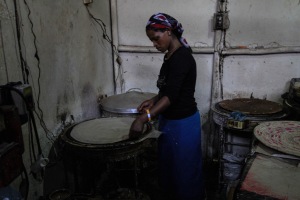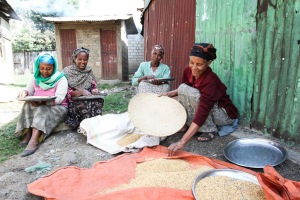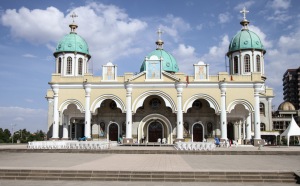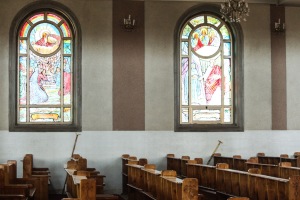What a rough life I lead, I mean seriously… I am currently living in a tropical jungle, eating fresh pineapples, mangos and plantains, listening to the sounds of forest life just beyond the perpetually open windows of the sitting area, and my job here (if you can call it that) is photographing everything I see and then writing about it. Not too shabby, eh?
In all truth, Cameroon is perhaps some of the most beautiful land I have ever laid eyes on. Everything is green and lush, the jungle is thick enough that one just might become lost the moment they step foot in it. The chorus of bird noises sound exactly like one of those nature cd’s, you know, the ones titled, “Soothing Sounds,” or “Tropical Rain Forest?” Come to think of it, I should just record my own and then sell it for mega bucks. I’ll call it, “The Voices of Cameroon.” Well, maybe not. Anywho, I think you get my point. The beauty here is unreal.

I have ventured into town on more than one occasion with Ben and Michelle Dunlap, and it seems like every time I do, I receive a marriage proposal or something akin to that. I accompanied the Dunlaps to the West Africa Advanced School of Theology, where I took some photographs and videos for Speed the Light. In one of the classrooms, as I was introducing myself, one young man asked if I was married. I laughed and said that I was not. Immediately, the entire room of young men erupted into clapping and cheers, proclaiming that I could choose any of them. Later, Michelle turned to me and shrugged, “Well, at least you’ve got options.”
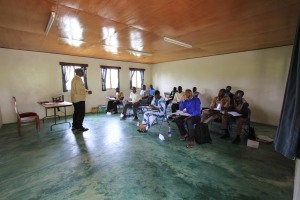
A classroom at the West Africa Advanced School of Theology
The town of Yaounde is also the capital city of Cameroon, dwarfed only by the port city of Douala. The population of Yaounde is at roughly two and a half million people as of 2014. Yaounde was founded in 1888, during the period of the German protectorate and was occupied by Belgian troops in 1915. It was declared the capital of French Cameroun in 1922. French is still the national language of Cameroon. I must say, French is a great deal easier to speak than Ethiopia’s Amharic, but I still find myself stumbling terribly over it. I have taken to greeting people in French, saying either, “Bonjour, ca va? or Bonjour, comment allez-vous?” This usually works pretty well, but the problem occurs when they think I must be Francophone, so they swiftly rattle off in French and I am left looking like an idiot.
“Je suis anglophone.”
Then they usually laugh and switch to English, or if they speak no English, then they continue on in French and I frantically search for Ben or Michelle to translate. It is my intent to study both French and Arabic when I return to the states. Yaounde can be dangerous to foreigners, particularly after dark, due to bandits that lurk on the roads, seeking unsuspecting whites with money and goods. A few weeks before I arrived here, some of the missionaries were attacked by bandits on their way from the airport- all of their goods and vehicle were stolen, but luckily, they walked away unscathed. Yesterday I was chatting with a woman from the states, who is here to adopt three girls from the Central African Republic, and she told me that her phone was stolen from her in the marketplace, right out of her car! She was literally holding it, scrolling through photographs, when a hand snaked in, snatched it and was gone. She chased the man down, and with the help of the locals, her phone was recovered, and the man was punished (beaten) by other men. Thievery is a horrible offense in Cameroon, punishable in some cases by death; the man is lucky that the property was recovered, or he too could have been subjugated to harsher abuse.

For every “bad” person in Cameroon, there are ten “great” people. This is what I have found of Africa in general. In the news, we only ever hear of horrible men who attack and abuse, possessing little regard for human life. This simply is not the truth. The most honest, noble, life respecting individuals I have ever had the privilege of meeting come from Africa. Africans are a hard working, intelligent and noble people, and I have never felt more at home than in their company. The Dunlaps’ house is currently under construction by six local men: Josef, Felix, Innocent, John Basco, Barthlomew and Michele. They begin their work every morning at eight, hammering and sawing on large pieces of lumber, singing and, at times, giggling with one another like school girls. The men always greet me with broad smiles and hellos, whether it be in French or English. I have come to love hearing them sing, and at times, I find myself joining in on their songs. As Ben and Michelle will attest, they are great guys, honest and diligent in their work. They have also saved the compound from any number of snakes multiple times.
Cameroon is home to a number of the world’s deadliest snakes, including, vipers, green mambas and black mambas. Vine snakes are also common, though not deadly. I have been hoping to come across a snake, particularly a black mamba (from a safe distance of course) but I have yet to see even a common vine snake.
Yesterday I went into town with Ben and Michelle, to look at some ceiling fans and to check out Yaounde’s only coffee shop. While Ben took care of the fans, Michelle and I ducked into a store called, “Numero Uno,” basically (as we found) Yaounde’s equivalent of Forever 21. A blast of cool air and Iggy Azalea, blaring over the speakers, greeted us, and I found myself perusing the latest fashions. All of the clothing came from Zara, a European based company. I purchased a long sleeve, light weight shirt for Egypt (as the dress code there is quite strict) and a large bag for carrying all of my recently acquired treasures. After that, we took to the streets again. An older man approached my car window at one point, intrigued by the light haired, light skinned American woman, and one of the store’s guards chased him away, nodding to me as though to say, “I got you.” Yeah, we’re tight. The coffee shop proved to be quaint and refreshing, a refreshing respite from the mayhem just outside. Michelle and I ordered caramel macchiatos (which were good, but not quite as good as Ethiopia) and Ben ordered pain perdu, French toast topped with ice cream. I sat facing the window, and was able to see everyone who passed by. It seemed that every other passerby was a woman or a child begging for money or trying to sell something, presumably in order to support themselves or their families. It is a hard thing to see, knowing there is not much, if anything, you can do to help them. It was the same in Addis Ababa, the poverty is overwhelming. I did give money to one woman there, she looked older than she probably was, weathered by the sun, beaten by life, she had two, young children, one of which she was breast feeding in the middle of the street. That really struck me. I gave her 100 birr, the equivalent of roughly $5, and took her hand, wanting so badly to hug her, to tell her that she was loved. But I didn’t hug her and I didn’t tell her she was loved, I simply pressed the money into her hand and walked back to the car. That woman is going to haunt me for a long time.
I keep hoping that my time in Cameroon will last forever. It is such a beautiful, even peaceful place, and I am loathe to leave the jungle. After six days here, I have encountered so many incredible people, individuals who have added to my life in more ways than they could ever realize, and the thought of leaving breaks my heart. But, as I have discovered in my twenty three years of life, it is better to live in the moment, revel in the here and now, because tomorrow will come all too swiftly.
Life is like a shadow and a mist; it passes quickly by, and is no more. –African Proverb

Two children play on a street in a Muslim district of Yaounde

Four children pose for a picture on a road in M’balmayo, Cameroon

A woman peels potatoes at the West Africa Advanced School of Theology. The potatoes will be used in student and faculty lunches.

A street market in Cameroon

















